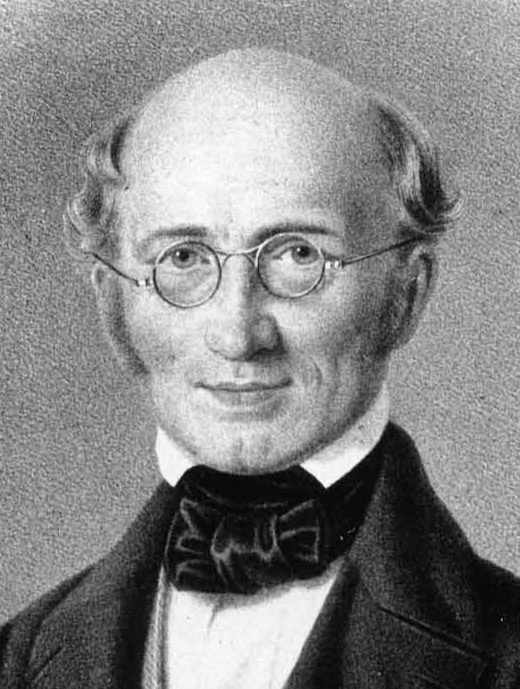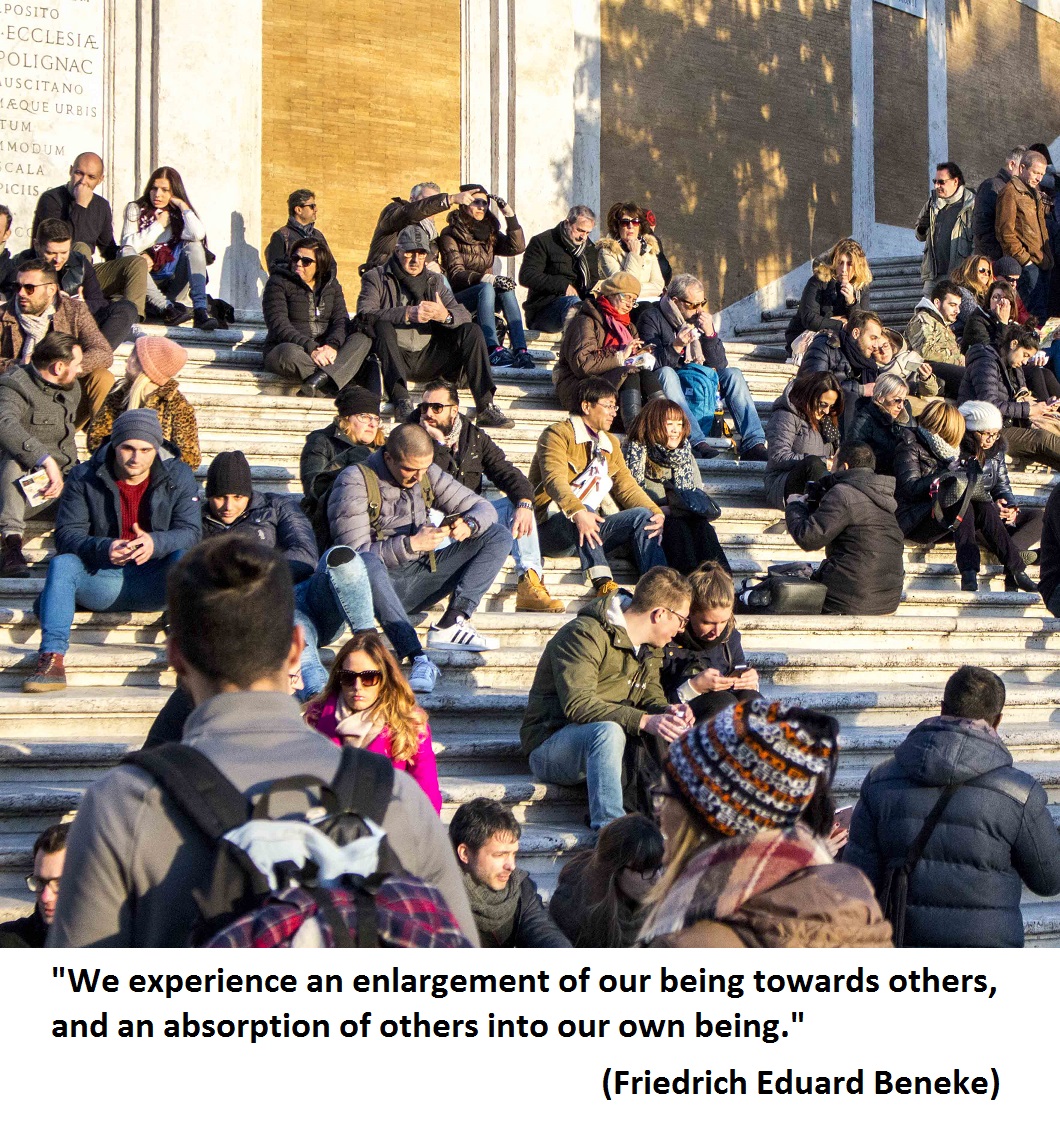|
Morality expresses the ideal human essence
 Friedrich Eduard Beneke (1798-1854) was a German philosopher who struggled against the philosophical norms of his time, and throughout his life was persecuted for his views by academic and political authorities. He studied philosophy at the University of Berlin with the feeling that his mission was to open a new path for philosophy. In his dissertation, the 24-year old Beneke passionately attacked Kantian philosophy, arguing against Kant’s idea of apriori knowledge. Instead, he argued, the root of all knowledge must be empirical psychology. From this perspective he also attacked the philosophies of Hegel and Fichte, two influential and powerful professors at the time. In 1822 his lectures at the University of Berlin were stopped by the authorities. In response, for many months he contacted many academic and political figures to try to cancel this decision. He did this with remarkable persistence, but without success. It seems that Hegel himself was behind the attempt to silence the young thinker. When the University of Jena showed interest in Beneke, the Grand Duke did not allow his employment. Only in 1824 did he manage to find work as a philosophy professor at the University of Gottingen, where he wrote some of his main books. Three years later he was given permission to continue teaching at the University of Berlin. He returned to Berlin, but once again was attacked by many critics. Friedrich Eduard Beneke (1798-1854) was a German philosopher who struggled against the philosophical norms of his time, and throughout his life was persecuted for his views by academic and political authorities. He studied philosophy at the University of Berlin with the feeling that his mission was to open a new path for philosophy. In his dissertation, the 24-year old Beneke passionately attacked Kantian philosophy, arguing against Kant’s idea of apriori knowledge. Instead, he argued, the root of all knowledge must be empirical psychology. From this perspective he also attacked the philosophies of Hegel and Fichte, two influential and powerful professors at the time. In 1822 his lectures at the University of Berlin were stopped by the authorities. In response, for many months he contacted many academic and political figures to try to cancel this decision. He did this with remarkable persistence, but without success. It seems that Hegel himself was behind the attempt to silence the young thinker. When the University of Jena showed interest in Beneke, the Grand Duke did not allow his employment. Only in 1824 did he manage to find work as a philosophy professor at the University of Gottingen, where he wrote some of his main books. Three years later he was given permission to continue teaching at the University of Berlin. He returned to Berlin, but once again was attacked by many critics.
Beneke lived a simple life, and was admired by a small circle of friends and followers. Several writers noted that he was kind even to his many enemies. In 1854 he suddenly disappeared, and two years later his body was discovered in a canal. His death remains a mystery, and may be related to his insomnia, or may have been suicide.
Beneke represents the philosophical approach which tries to base philosophical ideas on psychological facts (as opposed to basing them on a priori, conceptual, or logical considerations). This approach is called “psychologism,” especially by its opponents, as a negative word that implies a confusion between psychology and philosophy. In fact, the term “psychologism” was invented specifically against Beneke. Psychologism had some following in 19th century Germany, but some important philosopher, such as Frege and Husserl, rejected it. It is close in spirit to contemporary approaches such as naturalism.
The following text is adapted (with minor simplifications) from Beneke’s book Foundations of the natural system of practical philosophy (1837). Here Beneke argues that the morally right or wrong is a universal value that is based on basic structures of human psychology. But he is not talking about the psychology of ordinary people (otherwise morality wouldn’t be universal, since different people have different psychological tendencies). Rather, morality is based on an IDEAL psychology, the psychology of a person who is fully and perfectly developed. Many people, of course, do not have a fully developed character, so their actual psychology does not correspond to what is morally right. But when we are aware of ourselves, we experience the command to be moral in accordance with the ideal structures. The moral command is, then, the command to return to our original psychological structure, and in this way to fulfill our human nature.
But what is true or right, and what is the universal and necessary nature of good and evil? As I have just said, we should reply here: It is what comes from the fundamental essence of human nature, and is conditioned by it. The demands of morality are in complete harmony with what is natural, if we regard them in their original purity. Or (from a different point of view), moral commands, however ideal they may be, are nevertheless given to us as natural products of the human spirit. The soul, therefore, by virtue of its deepest nature, must contain in itself the principles that underlie these moral commands. But what are these principles?
[…]
 It is so evident, beyond any need of argument, that moral consciousness cannot be reduced to egoistic interests, either in the case of the individual, or even in the case of the state, which is also an individual in the form of a group. If such an argument may be still be needed today, I have already given it elsewhere. I have shown that limiting ourselves to what is beneficial or harmful to us should definitely be rejected as immoral. Likewise, the theory that the well-being of others can motivate us only if it impacts us, and that it must therefore be based on our own well-being or on a selfish interest – this theory is based on a psychological error. […] We are not limited to egoistic structures, but on the contrary, we experience an enlargement of our being towards others, and an absorption of others into our own being, so that we respect their being for its own sake and independently of our self-concern. The highly developed moral consciousness demands this altruism with an authority that cannot be questioned. It is so evident, beyond any need of argument, that moral consciousness cannot be reduced to egoistic interests, either in the case of the individual, or even in the case of the state, which is also an individual in the form of a group. If such an argument may be still be needed today, I have already given it elsewhere. I have shown that limiting ourselves to what is beneficial or harmful to us should definitely be rejected as immoral. Likewise, the theory that the well-being of others can motivate us only if it impacts us, and that it must therefore be based on our own well-being or on a selfish interest – this theory is based on a psychological error. […] We are not limited to egoistic structures, but on the contrary, we experience an enlargement of our being towards others, and an absorption of others into our own being, so that we respect their being for its own sake and independently of our self-concern. The highly developed moral consciousness demands this altruism with an authority that cannot be questioned.
[…]
And it is just here that psychology reveals itself as the underlying science of morals; or (if I am permitted to use the expression), as the mathematics of morals. The analysis of the moral phenomenon represents nothing that is new, and nothing that has not from the beginning existed in the moral consciousness. If it tried to do this, it would be untrue, since it would falsify the moral consciousness by putting something foreign in it.
[…]
We can now present in the clearest light the necessary and universal validity of moral duties, which until now we have been forced to leave in a certain obscurity. What does it mean when we say that everyone must value the intellectual more highly than the sensory, and the well-being of the community more highly than one’s own limited well-being? […]
 I answer: The universal validity comes from the fact that the moral scale [bad and good] is inherent in all humans in the same way, through the fundamental structure of their practical development. But besides these fundamental structures, there also exist other structures which can prevent and destroy this development. And if this happens, the result is that the universal endowment, and other inborn endowments, are nevertheless not universal in practice, and are not manifested in people’s behavior in the same way. And this also limits the necessary nature of morality. Moral necessity is, of course, to some degree a natural necessity, and it belongs to the deepest natural structures of our practical development. But this is the necessity of a natural development that is uninterrupted and pure (and, one might say, ideal), and in this respect it is only a limited and conditional necessity. Under corrupting influences, however, and in contrast to them, that original necessity of nature does not fully express itself. When these corrupting influences become known to us, that purer development becomes a moral command that is imperative for anyone who wants to be a human being in the higher sense of this word, or who seeks to represent in himself the fundamental norm of human nature in its purity. I answer: The universal validity comes from the fact that the moral scale [bad and good] is inherent in all humans in the same way, through the fundamental structure of their practical development. But besides these fundamental structures, there also exist other structures which can prevent and destroy this development. And if this happens, the result is that the universal endowment, and other inborn endowments, are nevertheless not universal in practice, and are not manifested in people’s behavior in the same way. And this also limits the necessary nature of morality. Moral necessity is, of course, to some degree a natural necessity, and it belongs to the deepest natural structures of our practical development. But this is the necessity of a natural development that is uninterrupted and pure (and, one might say, ideal), and in this respect it is only a limited and conditional necessity. Under corrupting influences, however, and in contrast to them, that original necessity of nature does not fully express itself. When these corrupting influences become known to us, that purer development becomes a moral command that is imperative for anyone who wants to be a human being in the higher sense of this word, or who seeks to represent in himself the fundamental norm of human nature in its purity.
|


 It is so evident, beyond any need of argument, that moral consciousness cannot be reduced to egoistic interests, either in the case of the individual, or even in the case of the state, which is also an individual in the form of a group. If such an argument may be still be needed today, I have already given it elsewhere. I have shown that limiting ourselves to what is beneficial or harmful to us should definitely be rejected as immoral. Likewise, the theory that the well-being of others can motivate us only if it impacts us, and that it must therefore be based on our own well-being or on a selfish interest – this theory is based on a psychological error. […] We are not limited to egoistic structures, but on the contrary, we experience an enlargement of our being towards others, and an absorption of others into our own being, so that we respect their being for its own sake and independently of our self-concern. The highly developed moral consciousness demands this altruism with an authority that cannot be questioned.
It is so evident, beyond any need of argument, that moral consciousness cannot be reduced to egoistic interests, either in the case of the individual, or even in the case of the state, which is also an individual in the form of a group. If such an argument may be still be needed today, I have already given it elsewhere. I have shown that limiting ourselves to what is beneficial or harmful to us should definitely be rejected as immoral. Likewise, the theory that the well-being of others can motivate us only if it impacts us, and that it must therefore be based on our own well-being or on a selfish interest – this theory is based on a psychological error. […] We are not limited to egoistic structures, but on the contrary, we experience an enlargement of our being towards others, and an absorption of others into our own being, so that we respect their being for its own sake and independently of our self-concern. The highly developed moral consciousness demands this altruism with an authority that cannot be questioned. I answer: The universal validity comes from the fact that the moral scale [bad and good] is inherent in all humans in the same way, through the fundamental structure of their practical development. But besides these fundamental structures, there also exist other structures which can prevent and destroy this development. And if this happens, the result is that the universal endowment, and other inborn endowments, are nevertheless not universal in practice, and are not manifested in people’s behavior in the same way. And this also limits the necessary nature of morality. Moral necessity is, of course, to some degree a natural necessity, and it belongs to the deepest natural structures of our practical development. But this is the necessity of a natural development that is uninterrupted and pure (and, one might say, ideal), and in this respect it is only a limited and conditional necessity. Under corrupting influences, however, and in contrast to them, that original necessity of nature does not fully express itself. When these corrupting influences become known to us, that purer development becomes a moral command that is imperative for anyone who wants to be a human being in the higher sense of this word, or who seeks to represent in himself the fundamental norm of human nature in its purity.
I answer: The universal validity comes from the fact that the moral scale [bad and good] is inherent in all humans in the same way, through the fundamental structure of their practical development. But besides these fundamental structures, there also exist other structures which can prevent and destroy this development. And if this happens, the result is that the universal endowment, and other inborn endowments, are nevertheless not universal in practice, and are not manifested in people’s behavior in the same way. And this also limits the necessary nature of morality. Moral necessity is, of course, to some degree a natural necessity, and it belongs to the deepest natural structures of our practical development. But this is the necessity of a natural development that is uninterrupted and pure (and, one might say, ideal), and in this respect it is only a limited and conditional necessity. Under corrupting influences, however, and in contrast to them, that original necessity of nature does not fully express itself. When these corrupting influences become known to us, that purer development becomes a moral command that is imperative for anyone who wants to be a human being in the higher sense of this word, or who seeks to represent in himself the fundamental norm of human nature in its purity.